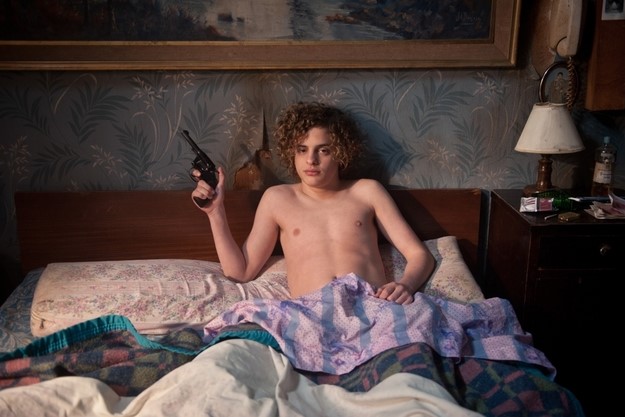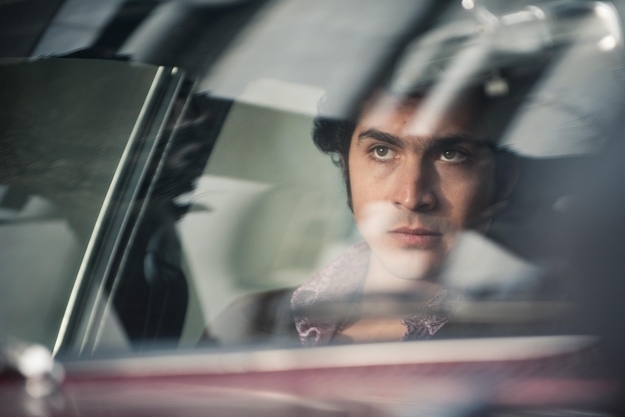Film of the Week: El Angel

When Buenos Aires police caught killer Carlos Eduardo Robledo Puch—according to his life story, as told in Luis Ortega’s El Angel—no one in Argentina knew how to deal with the young man’s beauty. At the end of the film, a glimpsed headline claims that Robledo disproves the famous Lombroso principle: put bluntly, the idea, proposed by 19th-century criminologist Cesare Lombroso, that born criminals could be recognized by atavistic deformities. In other words, they were likely to be as ugly as sin. If Robledo disproved that rule, Ortega’s film only confirms a consistent principle in contemporary cinema, namely that real-life criminals are likelier to get movies devoted to them the prettier they are—a rule that’s pretty much been in place since Bonnie and Clyde.
When, in fact, did you see a major mainstream film mythifying the career of a really rough-looking or visually mundane criminal? If there are exceptions, and I’m thinking of Bronson, Chopper, or Monster, they’re usually played by actors who are notably presentable in real life, roughing it up a bit for the camera. (British cinema, it’s true, has produced a profitable subgenre of dramas about real-life villains, usually played by men who, like the originals, have faces like worn-out rugby boots, but this may be an odd peculiarity of the nation’s self-image. )
Robledo was comelier than early ’70s Argentina expected from anyone so dangerous. His face was his fate, and similarly it’s the main selling point of El Angel, the seventh and most visible to date of Ortega’s films (it’s Argentina’s entry for the Oscars, with Agustín and Pedro Almodóvar among its producers). Its young debut star Lorenzo Ferro looks a lot like Robledo in his prime—not so much in his actual physiognomy, but because his face in the film, oddly rubbery and usually set in a narcissistic smirk, has the knowing look of someone always proudly aware of an imaginary camera nearby. In many pictures of the young Robledo, he looks as if he’s performing the photogenic defiance that stoked his notoriety. And Ferro—perhaps partly because he’s a young, attractive actor—always has that flagrant “Are you watching?” look: Ortega has him flirt mercilessly with the audience, sometimes coquettishly straight to camera. That makes Ferro deeply plausible as a narcissistic killer aware of his own beauty—making that beauty considerably less charming, but also making Robledo seem somewhat like a model with darker ideas in mind than his wardrobe (although he’s thinking of that too). It also makes this entertaining film a little too knowingly detached to transcend a certain cool glibness.
The real Carlos Robledo Puch –known in the Argentinian press as “The Black Angel” or “The Angel of Death”—was active in the early ’70s, turning to violent theft in his late teens and chalking up 17 robbery charges by the time he was arrested in 1972 at the age of 20. Among other crimes, he was also charged with 11 murders, one rape, one attempted rape, and a count of sexual abuse; at one point, he’s even supposed to have shot at, but missed, a crying baby. Robledo was not a pleasant character, but El Angel conveniently glosses over the viler aspects of his career to concentrate on his glamour, his sexual ambivalence, and the pop-star quality that he seemed to be only too aware of—still seems to be, in fact. According to reports, Robledo—continuing his prison spell today at the age of 66—was determined that his story should be filmed by Spielberg, Scorsese, or Tarantino, and that he should be played by Matt Damon, or failing that, Leonardo DiCaprio (his second choice is indeed a lot closer to the reality, or was, when he was the age of Robledo in his precocious prime).
El Angel begins in Buenos Aires in 1971 with a voiceover by Ferro as Robledo, pitching himself to us in his rather creepy pinched voice as some sort of existential rebel: “Doesn’t anyone even care about being free?” Carlitos, as everyone calls him, breaks into a beautiful modernist house, and does a little disco dance on a red-carpeted floor—the film similarly ends with him doing another dance, this time in a blood-red polo-neck, with a coy close-up pout by way of signing off. Between these two moments of rapture comes the horror.
For those who are always inclined to say, “I blame the parents,” El Angel presents Carlos’s middle-class folks as being, not strictly complicit, but certainly enabling in their doting ineffectualness. His mother (Almodóvar veteran Cecilia Roth) naively shakes tut-tuts at the expensive items that people seem forever to be giving or lending him, while his dad (Neruda star Luís Gnecco) delivers a lukewarm homily on the virtues of hard work and deferred gratification. But the only deferred gratification that registers in Carlitos’s life is that of his more or less closeted passion for macho schoolmate Ramón (Chino Darín), a handsome head-boy type who punches him out early in the film, sealing a tender dependency from the start. Carlitos reacts by blowing him a contemptuous kiss; before long, they’re best friends, criminal cronies, and perhaps, eventually, lovers.

Clean-cut as Ramón appears to be, he’s from a grittily disreputable background—the son of a stone-faced ex-con José (Daniel Fanego), first seen with his balls dangling out of moldy shorts in close-up, and blowsy mum Ana Maria (Mercedes Morán), whose dressing-gown décolletage and silky purr suggest that it can’t be long before she hits on her son’s adorable little friend. The family take Carlitos to their hearts, knowing he’s as crooked as they are, and crazier. They admire his amorality, his recklessness even more: he’s impatient to take risks and push everything as possible, leading José to enthuse, “That kid’s a genius. If we train him, we can make a fortune.” Of course, he’s untrainable.
The crime is fun at first, given a groovy caper-movie spin: Ortega loves setting a robbery to an arch music-box waltz as Carlitos eyes the spoils, or speeding one up, with snappy jump cuts, to the sound of ’70s blues boogie (the contemporary soundtrack, presumably of 100-percent Latin American provenance, and including a Spanish-language “House of the Rising Sun,” is one of the film’s more distinctive assets). But things get weird, and menacing, fairly quickly. Found with a gun in his bed, Carlitos points it at his shocked mother, then asks, “Do you think I’d point a real gun at you?”—and we think that yes, he would, and very likely fire it too. An early robbery has the disconcerting feel of a dream, with Carlitos a baffled observer of what’s happening, as he shoots the elderly owner of a huge, atmospheric house, then follows him as he wanders around, refusing to acknowledge he’s been hit.
The film is big on the flirtiness between the two boys, and Carlitos’s seeming obliviousness to any sexual presence except his own and Ramón’s. He turns down an advance from Ana Maria, explaining, “I like your husband,” but it’s doubtful that moral qualms come into it; what he presumably means is that he really, really likes her son. He and Ramón take twin sisters out on motorbikes, Carlitos zooming down the road in a natty leather jacket, golden locks streaming in the breeze; Ramón’s girl grabs his dick as he drives, and you feel that the film is as turned on by the bad-boy glamour as she is. El Angel is dryly witty too about how beauty makes the rules not apply: when the two couples break into the grounds of a luxurious residence, a maid approaches them and asks if they’d like refreshments.
Things come to a homoerotic head when Carlitos tries on earrings during a jewelry heist. “You look like Marilyn Monroe,” says Ramón, half-mocking, half-appreciative. “I look like my mum when she was young,” replies Carlitos, in a line that offers itself, perhaps ironically, as a ready-made hint of psychological explanation. They look at themselves in the mirror, this dazzling, demonic duo. “Che and Fidel,” remarks Ramón. Carlitos, perhaps closer to the mark, disagrees: “Evita and Perón.” Something like a seduction happens in a shared hotel room when Carlitos decorates Ramón’s naked body with a crotchful of jewelry. Are they lovers at this point? The film hedges its bets, but a later explosion of bloodletting in the back of a bar suggests either jealous fury or a displacement activity to compensate for his beloved not putting out—to him, at least.
Did the real Robledo really favor a two-gun pose, like Jimmy Cliff’s Ivan in The Harder They Come? It’s plausible: he’s as conscious of himself being a bad boy on a silver screen as any self-aware cinema hood since Breathless’s Michel Poiccard first perfected his Bogart routine. Gorgeously shot by Julián Apezteguia and art-directed within an inch of its life, El Angel feels more than anything else like a lavishly decorated vitrine for the extraordinary exotic found object that is Lorenzo Ferro—a sullen, sultry wunderkind who could have walked out of a Caravaggio picture, with just a dash of Harpo Marx at his most satanic. It’s a witty performance, perfectly knowing and perfectly imbued with the naiveté and brashness—and outrageous hunger to impress—of his character. That character is a somewhat euphemistic comic-strip version of the real Robledo, however. Nasty as El Angel’s version is, its Carlitos is more like someone for whom violence and killing function primarily to support the image—the background content for a life that’s not so much a career of evil, more one long super-sexy music video.
Jonathan Romney is a contributing editor to Film Comment and writes its Film of the Week column. He is a member of the London Film Critics Circle.







